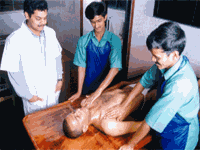 NEW YORK: India's traditional system of medicine, Ayurveda, has been for the first time included in an advisory body to the US National Institutes of Health (NIH) with the appointment of researcher Bala V. Manyam.Manyam, a professor and director of Plummer Movement Disorders Center, in the Neurology Department at the Scott & White Clinic in Temple, Texas, has been appointed to the National Advisory Council for Complementary and Alternative Medicine (NACCAM) of the NIH.The 12-member NACCAM, as its name implies, advises NIH on applications for research grants in the field of alternative medicine, and includes leading experts in naturopathy, acupuncture, and Chinese traditional, chiropractic and herbal medicine.
NEW YORK: India's traditional system of medicine, Ayurveda, has been for the first time included in an advisory body to the US National Institutes of Health (NIH) with the appointment of researcher Bala V. Manyam.Manyam, a professor and director of Plummer Movement Disorders Center, in the Neurology Department at the Scott & White Clinic in Temple, Texas, has been appointed to the National Advisory Council for Complementary and Alternative Medicine (NACCAM) of the NIH.The 12-member NACCAM, as its name implies, advises NIH on applications for research grants in the field of alternative medicine, and includes leading experts in naturopathy, acupuncture, and Chinese traditional, chiropractic and herbal medicine.But this is the first such appointment in the field of ayurveda.Manyam is an allopathic doctor but has a deep interest in ayurveda as well."I found in those (Ayurveda) texts, which are thousands of years old, truths that hold today," Manyam told IANS. "It beats me how those ancient sages discovered them, but my quest has been to submit those truths to the rigours of modern scientific research."He recalled how as a medical student in Bangalore in the 1960s, he had come across references in ayurvedic texts to the 'kunch' seed, called 'guruganji' in Kannada, as effective birth control agents.But being unable to carry out research on them, he showed the references to a professor at the Indian Institute of Science."
In the early 60s, when even condoms had to be imported and India was exercised over its overpopulation problem, my leads should have been enthusiastically followed up. Instead, the IISc professor not only did not encourage me, but even failed to return my books," Manyam rued.Manyam's investigations have led to advances in the treatment of Parkinson's disease.In a paper presented at the National Parkinson Foundation, the Indian doctor said: "Physicians in ancient India first used Mucuna seeds in the treatment of Parkinson's disease over 4500 years ago."
Manyam said Parkinson's disease existed in ancient India and was called 'kampavata'."
Despite the fact that Mucuna was used in the treatment of Parkinson's disease in ancient times, it is still important today to establish that the drug does not have adverse effects on various vital organs," Manyam asserted.
Manyam's role at NACCAM will be to give his evaluation of proposals for research in the field of ayurveda.


No comments:
Post a Comment